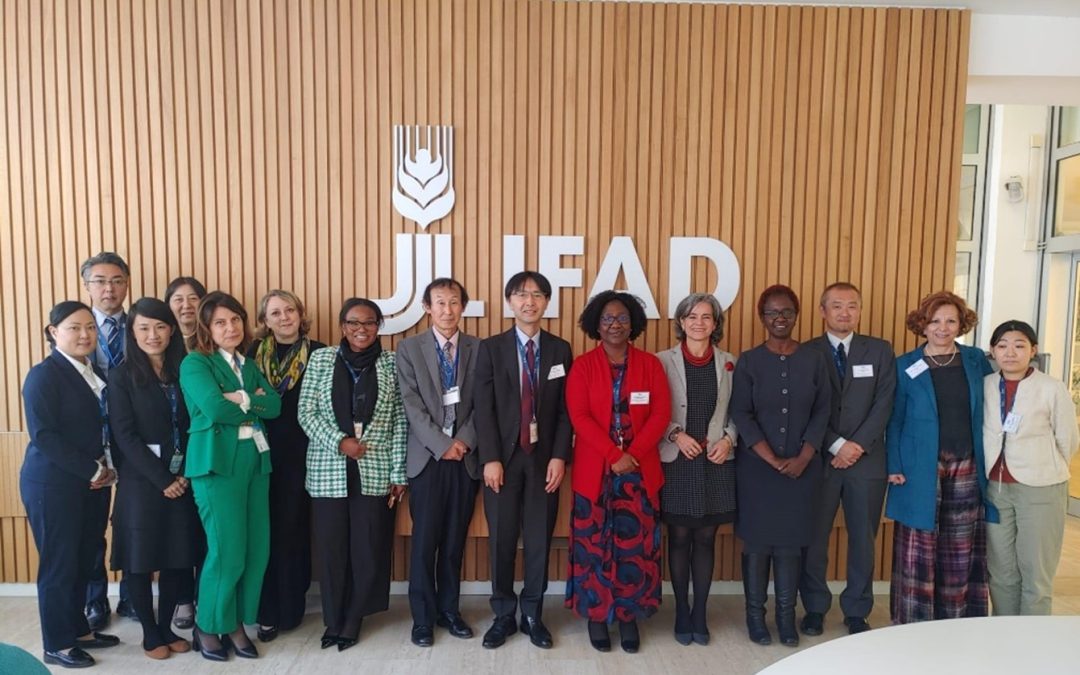The 11th Steering Committee (SC) Meeting for IFNA was held on 8 March 2024 in Rome, Italy. The main agenda for the meeting was to share the progress of IFNA in 2023 and the planned activities in 2024 and progress of evaluation of IFNA’s activities.
IFNA’s SC members presented at the meeting were International Fund for Agricultural Development (IFAD), Food and Agriculture Organization (FAO), Japan International Cooperation Agency (JICA), Japan International Research Center for Agricultural Sciences (JIRCAS), New Partnership for Africa’s Development (AUDA-NEPAD), and World Food Programme (WFP). The meeting was co-chaired by JICA and AUDA-NEPAD.
The main issues discussed at the meeting were as follows:
1. Annual Report for 2023 and Annual Work Plan for 2024 explained by IFNA Chief Official:
- Annual Report for 2023
Advocacy event: AU Summit Side event in February 2023, AFRICA CLIMATE SUMMIT in September 2023
- Capacity Development: Regional Training with the economic communities of Central Africa (ECCAS), and Eastern Africa (EAC)
- Project implementation: sharing updated information of the pilot projects in Ghana, Kenya, Mozambique
2) Annual Work Plan for 2024
- Advocacy event: SUN Global Gathering, Africa Day for Food and Nutrition Security,
IFNA Partners meeting
- Capacity Development: Regional Training with Southern Africa Development Community (SADC) and West Africa States (ECOWAS)
As part of the regional training, a Nutrient Focused Approach application (NFA App) will be field tested in selected countries, especially on operationalizing the app.
- Project Implementation: continue to monitor the pilot project implementation in Ghana, Kenya and Mozambique. In Cameroon, IFNA will start a new small-scale project in 2024.
2. Progress of discussion on post-Malabo declaration, reported by AUDA-NEPAD
Senior Nutrition and Food Safety Officer, AUDA-NEPAD reported that the post Malabo agenda and roadmap will be launched on 8 March. In addition, the launch will be followed by various parallel activities as per the roadmap that includes analytical studies and stakeholder consultations to provide inputs into the drafting to the Post Malabo Agenda.
3. Progress of IFNA Review works, reported by IFNA Secretariat, with external consultant
IFNA review work from 2016 is to inform the post IFNA activities. The external consultants presented the midterm progress report and emphasized that some of the IFNA SC were interviewed. The study will be finalized by middle of July and the report will be disseminated.
The selected country Ghana was used as a case study to demonstrate IFNA tangible results such as including multisectoral collaboration to enhance IFNA stakeholders’ engagement. As for key recommendations, the external consultants mentioned the development of a robust ME framework for inclusive of theory of change to alignment with feasible project implementation. Furthermore, IFNA Chief Official presented the roadmap of IFNA to 2025 and highlighted such as survey for evaluation for IFNA and Post IFNA towards the end of 2024. He also mentioned that post IFNA will be presented at TICAD9 in August 2025.
4. Consideration of proposal
The followings were agreed:
- The IFNA SC approves the IFNA Annual Report 2023, as no SC members mentioned the comments that require modifications or further information on the report, and those who made the comments positively inclined.
- The IFNA Annual Work Plan 2024, including the presentation of IFNA-review progress by the consultants, was approved, subject to taking up the comments provided in this SC. There should be some revision, such as adding the budget and others, and then approved.
5. Closing
In conclusion, the Vice President of JICA summarized the meeting and also reflected the workshop for post IFNA discussion in the morning. Nutrition security in Africa is becoming more critical issue, so collaboration with SC members is necessary for tackling this challenge.

Recent Comments